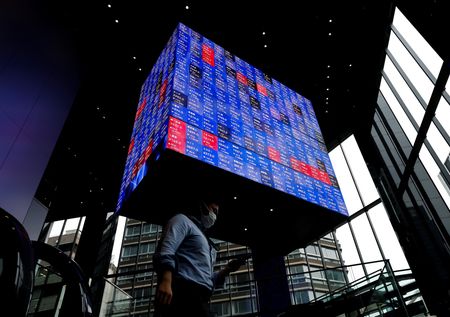
By Kevin Buckland
TOKYO (Reuters) – Japan’s Nikkei share average rose on Monday to its highest level since July 1990, buoyed by optimism over a U.S. debt ceiling deal and a weaker yen.
Shares of Japanese chip-related companies continued to outperform after AI euphoria lifted Wall Street peers.
The Nikkei jumped as high as 31,560.43 within the first 10 minutes of trading, although gains mitigated to see the index enter the midday break up 1.32% at 31,325.84, close to the session low.
U.S. President Joe Biden said on Sunday he had finalized a budget agreement with House Speaker Kevin McCarthy, and the deal was ready to move to Congress for a vote. However, the deal has drawn fire from hardline Republicans and progressive Democrats.
“The deal is not done, so there’s still a level of risk, but the basic agreement has seen risks recede and both sides have committed to avoiding a technical default,” said Maki Sawada, a strategist at Nomura Securities.
“The Nikkei crossed the psychological 31,500 mark on Monday, but in the end that level proved a bit too heavy,” she said. “This week, I expect the Nikkei to steadily advance, but with short-term retracements to check its speed.”
The broader Topix rose as high as 2,175.13, but failed to get close to last week’s 33-year high at 2,188.66. It entered the break up 0.96% at 2,166.41.
The Nikkei’s higher weightage towards exporter stocks saw it reap greater gains from the yen’s drop to the cusp of 141 per dollar for the first time in six months. A weaker currency buoys the value of overseas revenue.
Honda Motor rallied 1.86% and Subaru advanced 1.78%.
The Nikkei’s joint top performer was Advantest, the chip-testing equipment maker that counts Nvidia Corp among its clients.
Advantest shares surged up to 6.9% to a record high, although they entered the break up 4.18%, tied with Nikon and startup investor SoftBank Group.
Of the Nikkei’s 225 components, 193 rose, while 27 fell and five were flat.
(Reporting by Kevin Buckland; Editing by Himani Sarkar, Muralikumar Anantharaman, Sherry Jacob-Phillips and Sohini Goswami)
